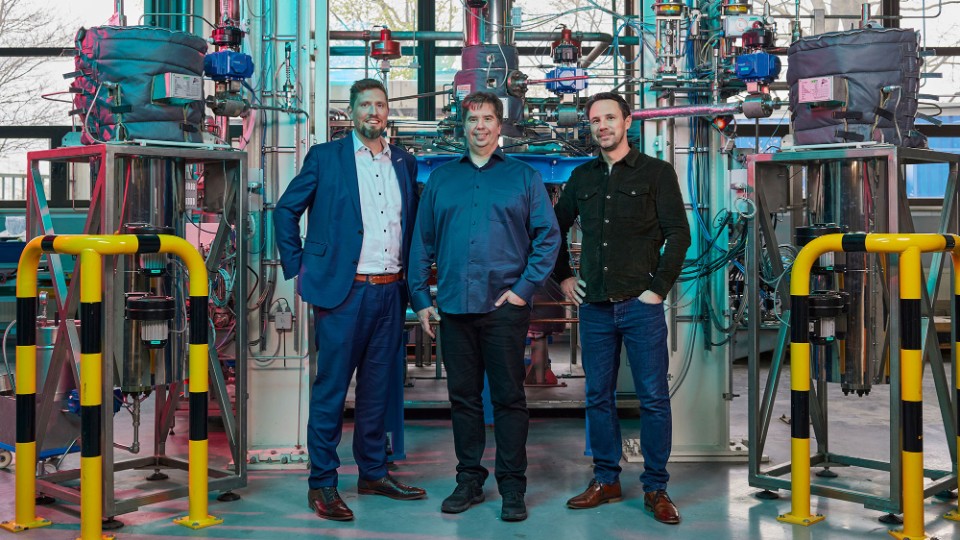Sustainable, affordable building insulation with aerogels

Privacy warning
With the click on the play button an external video from www.youtube.com is loaded and started. Your data is possible transferred and stored to third party. Do not start the video if you disagree. Find more about the youtube privacy statement under the following link: https://policies.google.com/privacyThe winners of the Joseph von Fraunhofer Prize for the project "Sustainable, affordable building insulation with aerogels": Christoph Dworatzyk from PROCERAM GmbH & Co. KG with Andreas Sengespeick and Nils Mölders from Fraunhofer UMSICHT (from left to right).
Joseph von Fraunhofer Prize 2023 winners:
Christoph Dworatzyk (PROCERAM GmbH & Co. KG)
Andreas Sengespeick and Nils Mölders (Fraunhofer Institute for Environmental, Safety and Energy Technology UMSICHT)
We need to lower our CO2 emissions systematically if we want to achieve our climate targets. Insulating buildings is a key part of this. A great deal of potential promises a sustainable, affordable mineral-based insulation material that is far more effective than options such as polystyrene.
Aerogels have already made it into the Guinness World Records as the lightest solids in the world – they consist of 99.8 percent air – and as the best insulation. And as they are made from the non-hazardous, natural raw material silicon dioxide, they are also sustainable and can be manufactured without the use of petrochemicals. However, up to now aerogels have been much too expensive to use as insulation, as the production was costly and time-consuming.
Manufacturing costs reduced by 70 percent
The objective of PROCERAM GmbH & Co. KG was affordable, large-scale aerogel production and thus an affordable non-combustible mineral insulation material that was a more effective insulator than alternative fossil-based materials. To this end, the entrepreneurs contacted experts at the Fraunhofer Institute for Environmental, Safety and Energy Technology UMSICHT. Within six years, the team from Nils Mölders and Andreas Sengespeick of Fraunhofer UMSICHT and Christoph Dworatzyk of PROCERAM GmbH & Co. created a new manufacturing process for producing aerogels without any environmentally hazardous chemicals – from the laboratory to the pre-commercial production level. The production costs for the, until then, very expensive aerogels dropped by 70 percent, and the production time was reduced from over 10 hours to 2.5 hours.
In order to decrease the costs and production time for aerogels at this scale, the research team focused on the production process. Typically, aerogels are produced using a sol – a medium containing finely distributed solid particles that has acid added to it to form a gel. Some 6 kilograms of acid are required to produce 1 kilogram of aerogel. The gel is then aged, undergoes a solvent exchange and is finally dried. Whereas supercritical carbon dioxide, which is between a liquid and gas in terms of its properties, was previously only used for drying, the researchers use it at every step in the process. Even the raw materials meet the sustainability requirement: The researchers tested more than 20 different types of silica sols that were readily available, inexpensive and non-toxic – as opposed to the established variants.
Mineral plaster is a highly effective insulator
In the final step of the process to create insulation material for buildings, the aerogel is broken down into grains 2 to 4 millimeters in size and mixed into a pure mineral plaster. This mixture has excellent insulation and physical properties, meaning that it outperforms conventional insulation materials such as polystyrene or mineral wool. Thus aerogels can reduce thermal conductivity by a factor of two when compared to polystyrene. And there’s another advantage, too: All aerogel raw materials, like sand and lime, can be put back into the circular material economy, i.e., can be recycled. The new production process therefore holds great potential both for the building technology sector and climate protection.
Funding note: The project "Aerolight" is funded by the German Federal Ministry of Economics and Climate Protection (BMWK) via the Project Management Jülich (PTJ). (Funding code: 03LB4006; duration: 01/04/2021 – 31/03/2024)